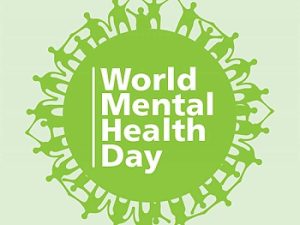Mental Health Prevalence and Awareness

World Mental Health Awareness day was 10/10. At VJLAP, we want to maintain the momentum of awareness this week via daily blog posts with information about mental health, reducing the stigma, and helping to improve your mental health.
Statistics:
Even before the COVID-19 pandemic, almost 1 billion people worldwide were living with mental disorders and nearly $1 trillion is lost annually in lost productivity due to depression and anxiety alone. (World Federation for Mental Health)
We know that mental, neurological, and substance use disorders exact a high toll on health outcomes, accounting for 13% of the total global burden of disease (World Health Organization, 2012). One person in every four will be affected by a mental disorder at some stage of their lives. We also know that this rate is much higher in the legal profession.
In 2016, the ABA/Hazelden study found that between 21 and 36 percent of lawyers qualify as problem drinkers and that approximately 28 percent, 19 percent, and 23 percent are struggling with some level of depression, anxiety, and stress, respectively. Lawyers also experience higher rates of suicide, social alienation, work addiction, sleep deprivation, job dissatisfaction, a “diversity crisis,” complaints of work-life conflict, incivility, a narrowing of values focused predominately on profit, and negative public perception.
Law students are equally at risk. The Survey of Law Student Well-Being found that 17 percent of law students experienced some level of depression, 14 percent experienced severe anxiety, 23 percent had mild or moderate anxiety, and six percent reported serious suicidal thoughts in the year prior to the survey. Even higher rates were found relating to substance use: 43 percent reported binge drinking at least once and 22 percent reported binge drinking two or more times in the two weeks prior to the survey, with one quarter falling into the risk category for alcohol addiction.
Impact:
With these alarming statistics prevalent throughout the legal profession and in society generally, each of us will either be affected by mental health concerns or we know someone who is. Yet, despite the findings of social prevalence and shared experiences, there is still a stigma associated with having a mental health concern or seeking help for it. A negative perception of either can lead to serious harm: symptoms can go unacknowledged and people can be reluctant to admit concerns or seek preventative or early intervention services. The consequence is that symptoms often worsen over time (note: some conditions can be situational and be resolved without intervention but could have been milder and resolved more quickly had the person received help). Conditions like depression can certainly be debilitating and a person can’t will themselves to feel better or snap out of it. They would if they could!
Action:
During this week you will be seeing stories from real people – legal professionals just like you, who have experienced mental health and substance abuse issues and are in recovery from these conditions. By sharing their stories they are shining a light on problems that are often in the shadows and giving hope to others who may need a beacon of hope and light to shine on their own difficulties.
If you are feeling concerned about your mental health or a loved one’s well-being, don’t be afraid to reach out. You can talk with a friend, a colleague, your doctor, your spiritual leader, a counselor, or VJLAP. We are free and confidential and we will help you to connect with resources to feel better.
** The contents of this article are not intended for the purpose of diagnostic or medical/psychological care. Consultation with a medical or mental health professional is recommended if you are concerned about your well-being.
